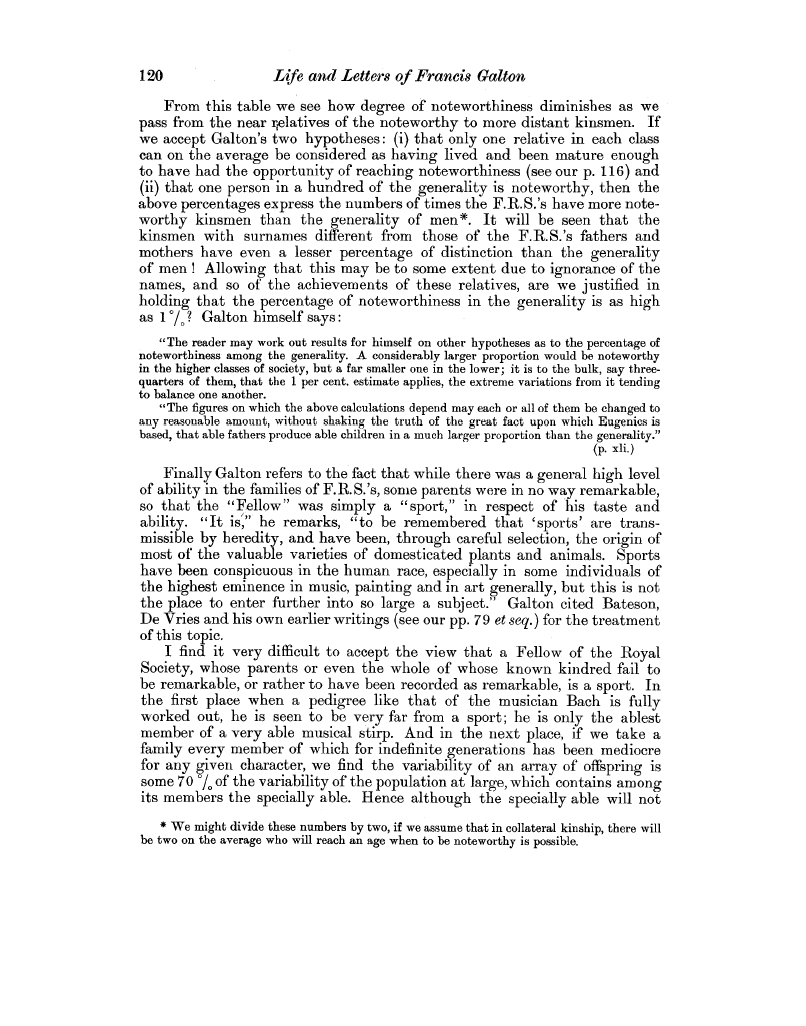| ||||||

OCR Rendition - approximate
120 Life and Letters of Francis Galton From this table we see how degree of noteworthiness diminishes as we pass from the near relatives of the noteworthy to more distant kinsmen. If we accept Galton's two hypotheses : (i) that only one relative in each class can on the average be considered as having lived and been mature enough to have had the opportunity of reaching noteworthiness (see our p. 116) and (ii) that one person in a hundred of the generality is noteworthy, then the above percentages express the numbers of times the F.R.S.'s have more noteworthy kinsmen than the generality of men*. It will be seen that the kinsmen with surnames different from those of the F.R.S.'s fathers and mothers have even a lesser percentage of distinction than the generality of men 1 Allowing that this may be to some extent due to ignorance of the names, and so of the achievements of these relatives, are we justified in holding that the percentage of noteworthiness in the generality is as high as 1'/,? Galton himself says "The reader may work out results for himself on other hypotheses as to the percentage of noteworthiness among the generality. A considerably larger proportion would be noteworthy in the higher classes of society, but a far smaller one in the lower; it is to the bulk, say threequarters of them, that the 1 per cent, estimate applies, the extreme variations from it tending to balance one another. "The figures on which the above calculations depend may each or all of them be changed to any reasonable amount, without shaking the truth of the great fact upon which Eugenics is based, that able fathers produce able children in a much larger proportion than the generality." (p. xli.) Finally Galton refers to the fact that while there was a general high level of ability in the families of F.R.S.'s, some parents were in no way remarkable, so that the "Fellow" was simply a "sport," in respect of his taste and ability. "It is; he remarks, "to be remembered that `sports' are transmissible by heredity, and have been, through careful selection, the origin of most of the valuable varieties of domesticated plants and animals. Sports have been conspicuous in the human race, especially in some individuals of the highest eminence in music, painting and in art generally, but this is not the place to enter further into so large a subject." Galton cited Bateson, De Vries and his own earlier writings (see our pp. 79 et seq.) for the treatment of this topic. I find it very difficult to accept the view that a Fellow of the Royal Society, whose parents or even the whole of whose known kindred fail to be remarkable, or rather to have been recorded as remarkable, is a sport. In the first place when a pedigree like that of the musician Bach is fully worked out, he is seen to be very far from a sport; he is only the ablest member of a very able musical stirp. And in the next place, if we take a family every member of which for indefinite generations has been mediocre for any given character, we find the variability of an array of offspring is some 70 °% of the variability of the population at large, which contains among its members the specially able. Hence although the specially able will not * We might divide these numbers by two, if we assume that in collateral kinship, there will be two on the average who will reach an age when to be noteworthy is possible.
|